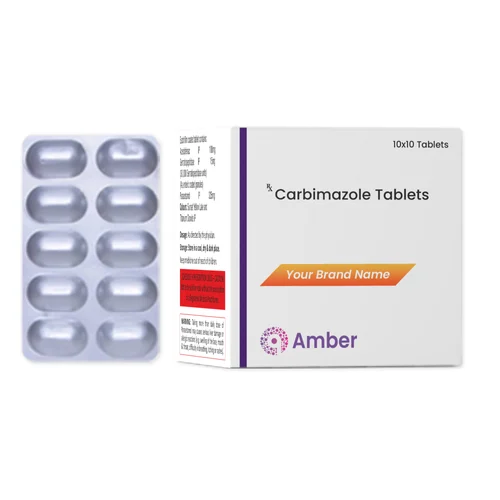💊 Carbimazole Tablet 10 mg – As Licensed
📄 **Description:
Carbimazole** is an antithyroid medication used to treat hyperthyroidism by suppressing the excessive production of thyroid hormones (T3 and T4). It is a prodrug that is converted in the body to the active form, methimazole.
🧾 Prescription / Use:
- Indications:
- Graves’ disease
- Toxic multinodular goitre
- Preoperative control before thyroidectomy
- Preparation before radioactive iodine therapy
- Dosage:
- Initial dose: 20–40 mg/day in divided doses
(i.e., 2–4 tablets of 10 mg) - Maintenance dose: 5–15 mg/day
- Doses may be reduced based on thyroid hormone levels
- Treatment typically continued for 12–18 months
- Initial dose: 20–40 mg/day in divided doses
- Route: Oral
🔬 Nature:
- Category: Antithyroid drug (Thionamide class)
- Form: Oral tablet
- Mechanism: Inhibits thyroid peroxidase enzyme, reducing production of T3 and T4 hormones
- Active Metabolite: Methimazole
🌟 Advantages:
- Non-invasive therapy for overactive thyroid
- Allows time for spontaneous remission
- Effective in both adults and children
- Can be used safely during pregnancy (with caution)
📦 Common Packaging:
- Tablet strength: 10 mg
- Typically packed in blister strips of 10 or 15 tablets
- Outer box with batch no., expiry date, and manufacturer name
🧊 Storage:
- Store at room temperature (below 25°C)
- Keep away from moisture, heat, and light
- Store in the original package
⚠️ Precautions:
Contraindications:
- Allergy to carbimazole or thionamides
- History of agranulocytosis
- Severe liver dysfunction
Use with Caution:
- Pregnancy: Avoid high doses in the first trimester (may switch to PTU)
- Breastfeeding: Can be used with caution and monitoring
- Monitor: CBC, liver function, and thyroid function regularly
Common Side Effects:
- Nausea, headache
- Rashes, itching
- Altered taste
Serious Risks:
- Agranulocytosis (low white cell count) – medical emergency
- Liver injury
- Vasculitis (inflammation of blood vessels)
👩⚕️ Patient Advice:
- Do not stop medication suddenly without doctor’s advice
- Take with or after food to reduce stomach upset
- Report immediately if you develop:
- Sore throat
- Fever
- Mouth ulcers
- Regular blood and thyroid tests are essential
- Avoid contact with infections due to possible low immunity

